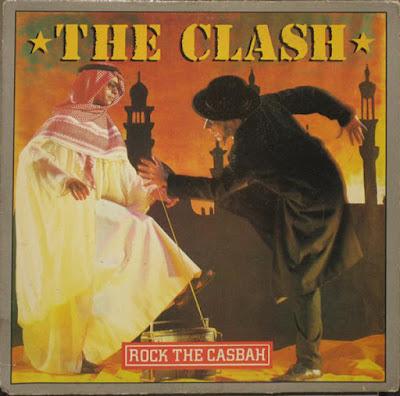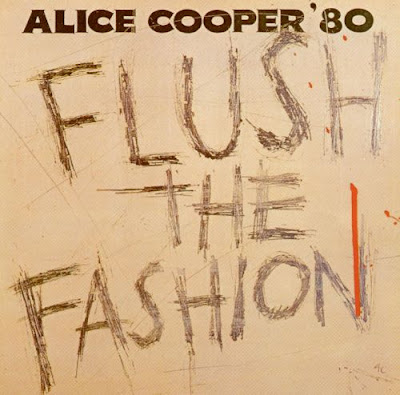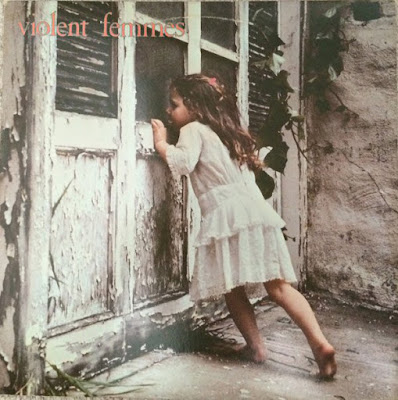“Shall We Dance” (1981) – Bram Tchaikovsky* Written by Bram Tchaikovsky * LP: Funland * 45: “Shall We Dance” / “Miracle Cure” * Producers: Nick Garvey and Bram Tchaikovsky * Label: Arista
Bram Tchaikovsky, from Lincolnshire, UK, was the stage name for Peter Bramall, formerly of the Motors. Because promotional images tended to show him standing as one of the blokes among his touring band, “Bram Tchaikovsky” was usually referred to as a group. (Joel Whitburn’s chart books still list the name this way, in the B section.) When Bram Tchaikovsky toured with Alice Cooper in 1980, then, the bill featured two groups that suffered from solo artist vs. band name confusion. (Alice had fixed the problem earlier by legally changing his name.) It was US touring that likely gave Tchaikovsky the stateside chart edge he didn’t enjoy back home. His 1979 “Girl of My Dreams” cracked the Top 40, while “Shall We Dance” — in spite of its potential for even broader early-eighties appeal, with its stuttering guitar, minimalist bursts of fluorescent keyboard, and promise of bliss via the dance floor — bubbled under at #109. Tchaikovsky, sadly, would resign from the music biz after this.
Category: 1980-1984
“Mustapha Dance” (1982) – The Clash
“Mustapha Dance” (1982) – The Clash * Written by the Clash * 12″ single: “Rock the Casbah” / “Mustapha Dance” * Produced by Mick Jones * Label: Epic
The odd musical singularity of the Clash’s “Rock the Casbah” seems to be one of those happy accidents. As drummer Topper Headon tells it, he had been tinkering around with a keyboard riff in the studio that ended up percolating throughout the hit recording. This was not the traditional Clash songwriting process, but the band had nonetheless ridden with it, after which Joe Strummer topped off Topper’s track with his own Middle Eastern word sauce. Their decision to give the mostly-instrumental dance version its own title invites the listener to approach it as a different entity and to take note of otherwise obscured wonders like Paul Simonon’s jounced-up bass line. A version by Paul Azzuba of a song called “Ya Mustapha” had perhaps gotten into Strummer’s lexicon when it reached #23 in early sixties Britain. Both sides of the “Rock the Casbah” 12-inch single credit Clash guitarist Mick Jones as the producer, while the Combat Rock LP says “mixed by Glyn Johns, made by the Clash.”
“Melt the Guns” (1982) – XTC
 “Melt the Guns” (1982) – XTC * Written by Andy Partridge * LP: English Settlement * Produced by XTC
“Melt the Guns” (1982) – XTC * Written by Andy Partridge * LP: English Settlement * Produced by XTCThe ten-song US version of XTC’s English Settlement might be their most well-chiseled and satisfying LP, even if such an approach violates the UK songcraft examplars’ tendency toward bounty. Those who know the album will find the chittery “Melt the Guns” drifting through their minds in our present gun lust era. Its clever jauntiness, though, gets in its own message’s way, with its powerful “let’s hope they shoot themselves instead of others” line muffled away in the bridge. Here’s to reinterpretive possibilities.
“Clones (We’re All)” (1980) – Alice Cooper
“Clones (We’re All)” (1980) – Alice Cooper * Written by David Carron * 45: “Clones (We’re All)” / “Model Citizen” * LP: Flush the Fashion * Produced by Roy Thomas Baker * Label: Warner Bros.
Alice Cooper’s Flush the Fashion LP revealed the seventies shock rocker losing his balance in a disorienting new decade. The single “Clones (We’re All),” though, which reminded no one of vintage Alice, sounded terrific at roller rinks alongside the likes of M’s “Pop Muzik,” Gary Numan’s “Cars,” and Blondie’s “Rapture,” and likely holds a place in the hearts of all preteens who experienced it that way. Although the song’s repeating space age synth riff and evil automaton lyrics pushed it up to number 40 on Billboard, Cooper wouldn’t make the US charts again until a 1989 career revival. The writer of “Clones (We’re All)” was a Massachusetts songwriter named David Carron, who was living in Los Angeles and was friends with Alice Cooper guitarist Davey Johnstone.




